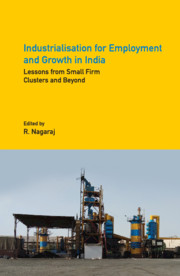Book contents
- Frontmatter
- Contents
- List of Tables
- List of Figures and Maps
- Preface and Acknowledgements
- 1 Introduction
- 2 Garment Cluster in Kolkata: The Untold Story of Expansion Relying on Low-end Domestic Demand
- 3 Constraints to Upgrading and Employment Expansion in the Tiruppur Knitwear Cluster
- 4 Determinants of Employment in the Indian Automobile Industry
- 5 Upgrading Technology and Space as Collective Strategy: Creation of Jobs and Market Potential in Gujarat’s Ceramic Clusters
- 6 Sports Equipment Manufacturing in India: A Firm-level Inquiry into Growth and Employment Dynamism
- 7 Aligarh Lock Cluster: Unravelling the Major Impediments
- 8 Continued Misery or a Change in Fortune? The Case of the Howrah Foundry Industry
- 9 Redevelop and Perish, or Survive and Grow? The Case for Supporting Informal Leather Enterprises in Dharavi, Mumbai
- 10 Growth Performance, Competitiveness and Employment in MSMEs: A Case Study of the Rajkot Engineering Cluster
- 11 Manufacturing and Automation
- About the Contributors
- Index
11 - Manufacturing and Automation
Published online by Cambridge University Press: 31 July 2021
- Frontmatter
- Contents
- List of Tables
- List of Figures and Maps
- Preface and Acknowledgements
- 1 Introduction
- 2 Garment Cluster in Kolkata: The Untold Story of Expansion Relying on Low-end Domestic Demand
- 3 Constraints to Upgrading and Employment Expansion in the Tiruppur Knitwear Cluster
- 4 Determinants of Employment in the Indian Automobile Industry
- 5 Upgrading Technology and Space as Collective Strategy: Creation of Jobs and Market Potential in Gujarat’s Ceramic Clusters
- 6 Sports Equipment Manufacturing in India: A Firm-level Inquiry into Growth and Employment Dynamism
- 7 Aligarh Lock Cluster: Unravelling the Major Impediments
- 8 Continued Misery or a Change in Fortune? The Case of the Howrah Foundry Industry
- 9 Redevelop and Perish, or Survive and Grow? The Case for Supporting Informal Leather Enterprises in Dharavi, Mumbai
- 10 Growth Performance, Competitiveness and Employment in MSMEs: A Case Study of the Rajkot Engineering Cluster
- 11 Manufacturing and Automation
- About the Contributors
- Index
Summary
Introduction
The initiation of the Make in India programme is yet another statement of the desire of the government to increase employment in the country through the manufacturing route. Under this programme, the manufacturing sector is expected to contribute at least a quarter of India's gross domestic product (GDP) by 2020. However, recent events and discussions have brought to the fore the pessimism that not much employment possibilities emanate from the manufacturing sector due to its capital-intensive nature, which the sector had become for quite some time now. The worst fears on this issue have been accentuated with the increasing automation of manufacturing processes elsewhere in the world. Industrial automation is thought to have a deleterious effect on the creation of employment in different sectors of the economy, manufacturing included. This has given rise to an important debate, primarily in the context of developed countries where industrial automation has diffused manifold and that too over a much longer period of time. This debate, although originally in the popular press, has now been brought to the formal academic table by the publication of an influential and highly cited piece of research by Frey and Osborne (2013). Subsequently, one of the leading academic journals, namely the Journal of Economic Perspectives, organised a symposium on the theme of ‘automation and labour markets’ in its 2015 summer issue. Thereafter, there has been a series of studies by academic economists and multilateral institutions such as the Organisation for Economic Co-operation and Development (OECD 2016) as well.
In the context, the purpose of the chapter is to understand the extent of the diffusion of automation technologies in Indian manufacturing and then analyse its effects on manufacturing employment.
Concept of Automation
A range of technologies are involved in industrial automation which manifests itself as both hardware and software. Employment implications of these various automation technologies vary considerably. The specific automation technology that has the most direct impact on employment is the use of multipurpose industrial robots. The International Federation of Robotics – IFR for short – defines an industrial robot as ‘an automatically controlled, reprogrammable, and multipurpose [machine]’ (IFR 2014).
- Type
- Chapter
- Information
- Industrialisation for Employment and Growth in IndiaLessons from Small Firm Clusters and Beyond, pp. 250 - 276Publisher: Cambridge University PressPrint publication year: 2021



